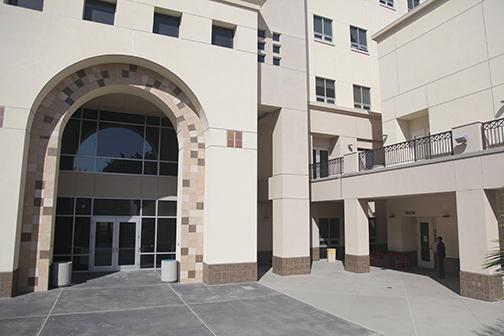The Associated Students University Council voted Wednesday to end discussion on a pending resolution intended to reaffirm support for academic freedom.
The resolution was drafted in response to controversy last month surrounding a lecturer’s use of course materials that drew crossfire from student organizations on both sides of the long-standing Israeli-Palestinian conflict.
Two students, both members of San Diego State’s Students for Justice in Palestine, introduced the resolution to the University Affairs Board. UAB member Nadir Bouhmouch and Campus Life Council member Hassan Abdinur drafted the resolution, which does not make specific mention of the controversy that inspired it, but reaffirms A.S.’s stance on academic freedom and suggests that policy be made explicit to students during new-student orientation and in their class syllabi.
The pending resolution was voted down 5-4 by the University Affairs Board after its initial reading. Another version of the resolution still alive in the University Council was set for a second reading and could have potentially gone on to receive the council’s support and become a full resolution.
A.S. Vice President of University Affairs Morgan Chan opened a vote about whether or not to continue action on the resolution after its defeat.
Abdinur addressed the council in a last-ditch effort to keep the resolution alive.
“The outcome of this resolution can only be good,” Abdinur told the council.
Members of the A.S. Board of Directors, most of whom sit on University Council, had debated the merits of the resolution at their meeting Monday, where the consensus emerged that a resolution was not the best way for A.S. to push for policy changes in this instance.
“I don’t think that we need to pass this resolution to state our support of academic freedom,” A.S. Vice President of Financial Affairs Mariah Kelly said at the Board of Directors meeting.
Kelly signaled what she saw as a worthwhile proposal contained in the resolution that class syllabi include the university’s academic freedom policy, but said the issue could be addressed through other channels.
Student-at-large representative Jessika Seekatz criticized the resolution as a vague reaffirmation of academic freedom that does not offer explicit support for the lecturer or mention the incident in question.
“We are speaking about it as this nebulous thing that doesn’t exist,” Seekatz told the board. “It’s just a thing that’s in the bylaws that we want to pat ourselves on the back for agreeing with. But it’s not saying in this particular instance because of this situation that arose we feel that A.S. should come out in support of this professor for teaching under his protection by academic freedom.”
Members of the Board of Directors took their concerns to the University Council, which voted down the resolution, with 15 votes against, five in favor and one abstention.
Following the vote, Abdinur said there could have been more debate before a vote on the resolution was taken.
“Some people just didn’t know what was going on and so they just automatically assumed that this resolution was useless,” he said. “If it was to be struck down it could have been struck down after there was more information out, after there was more debate going on.”
Yet another version of the resolution is still being reviewed by Campus Life Council, but cannot receive authorization because that council does not have the authority to approve resolutions.
Last month SJP, along with 13 other students organizations joined in support of the lecturer who used a map depicting Arabic-speaking countries that left Israel unnamed and labeled the area as Palestine, following outcry from pro-Israel groups that the map was misleading and against Israel.
Photo by Monica Linzmeier, Photo Editor







